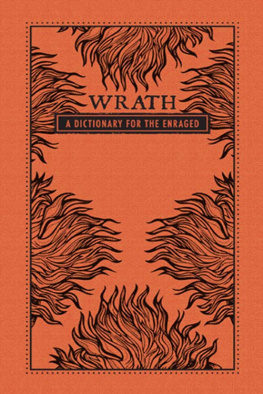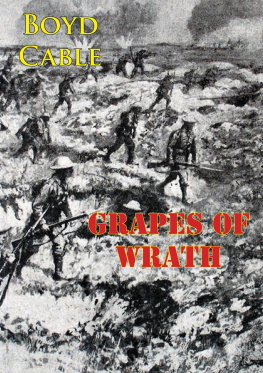NOUN: An intense anger; a vengeful punishment.
Many sins sow the seeds for war, but the unmitigated rage responsible for its execution comes from wrath. The destruction, the loss, the painall are left in the wake of this particular sin. Whether it comes down from on high like the gods rage in Homers Odyssey or boils up from inside like the fuel of Ahabs vengeful voyage, the vices choking grip has been felt throughout history and literature. Sometimes justified, oftentimes not, the results are always the same. While wrath is best defined in the gritted teeth and white-knuckled fist of the enraged, this short dictionary captures the spirit of the most combative sin.
A
abash
(uh-BASH)
VERB: To humiliate, shame, or embarrass someone.
abhorrent
(ab-HOR-ent)
ADJECTIVE: Repulsive or reprehensible.
abominate
(uh-BOM-ih-nayt)
VERB: To detest or hate intensely.
Even though the divorce was finalized, it didnt change the fact that Rachel still ABOMINATED her ex-husband for having an affair.
acerbate
(AS-er-bayt)
VERB OR ADJECTIVE: As a verb, to exasperate. As an adjective, embittered.
acrid
(AK-rid)
ADJECTIVE: Most often used to describe something that is bitter or harsh in smell or taste, the word can be applied in a more general sense to anything that is extremely angry and bitter.
acrimonious
(ak-ri-MO-nee-us)
ADJECTIVE: Bitter or hostile; something that is acrimonious is filled with anger and animosity.
adverse
(AD-vers)
ADJECTIVE: Acting in opposition to or in an antagonistic manner; unfavorable; hostile.
affliction
(uh-FLICK-shun)
NOUN: A condition of physical or mental suffering; hardship.
Sophies self-hatred became such an AFFLICTION that no one was surprised by her eventual suicide.
aggravate
(AG-ruh-vayt)
VERB: to make worse; to intensify; to cause to become irritated or inflamed.
alienate
(AY-lee-uh-nayt)
VERB: To isolate or make someone feel as if he or she no longer belongs somewhere; estrange.
amerce
(uh-MERSS)
VERB: To punish, especially with a monetary fine.
anathema
(uh-NATH-eh-muh)
NOUN: A person or thing that is shunned because it is extremely disliked or loathsome.
anger
(ANG-ger)
NOUN OR VERB: As a noun, a strong feeling of displeasure. As a verb, to arouse wrath within.
animadversion
(an-uh-mad-VER-zhun)
NOUN: An extremely critical and reproachful comment.
animosity
(an-ih-MOSS-ih-tee)
NOUN: Extreme hostility or resentment.
animus
(AN-uh-muss)
NOUN: Hostility or ill feeling.
I was angry with my friend:
I told my wrath,
my wrath did end.
I was angry with my foe:
I told it not,
my wrath did grow.
W ILLIAM B LAKE
antagonism
(an-TAG-uh-niz-uhm)
NOUN: An opposition between unfriendly or conflicting people or groups.
antipathy
(an-TIP-uh-thee)
NOUN: A feeling of strong revulsion or hostility or the source of that hostility.
If you feel such ANTIPATHY towards your job, why do you continue to go?
apocalyptic
(uh-pok-uh-LIP-tik)
ADJECTIVE: As in the Bibles book of Revelation, apocalyptic refers to an event involving widespread destruction or disaster.
apoplectic
(ap-uh-PLECK-tic)
ADJECTIVE: An apoplexy is a stroke, so apoplectic can refer to the symptoms of a stroke, but it also refers to being in a state of extreme anger or rage.
arson
(AHR-suhn)
NOUN: The intentional destruction of property by fire for malicious reasons.
artifice
(ART-ih-fuss)
NOUN: Clever trickery or deceit.
Through your well-rehearsed ARTIFICE you were able to embezzle over $40,000.
askance
(uh-SKANTS)
ADVERB: Can refer to looking at something in a sideways manner or with suspicion or disapproval; doubtfully.
asperity
(a-SPAYR-ih-tee)
NOUN: A manner that is harsh or severe; brusqueness.
aspersion
(uh-SPUR-zhun)
NOUN: A slanderous or defamatory charge; false accusation. The word is often used in the plural.
aversion
(uh-VUR-zhun)
NOUN: Extreme hatred or loathing; repugnance.







![Wood - Cia Rose Series Box Set [Books 1-3]](/uploads/posts/book/141420/thumbs/wood-cia-rose-series-box-set-books-1-3.jpg)













